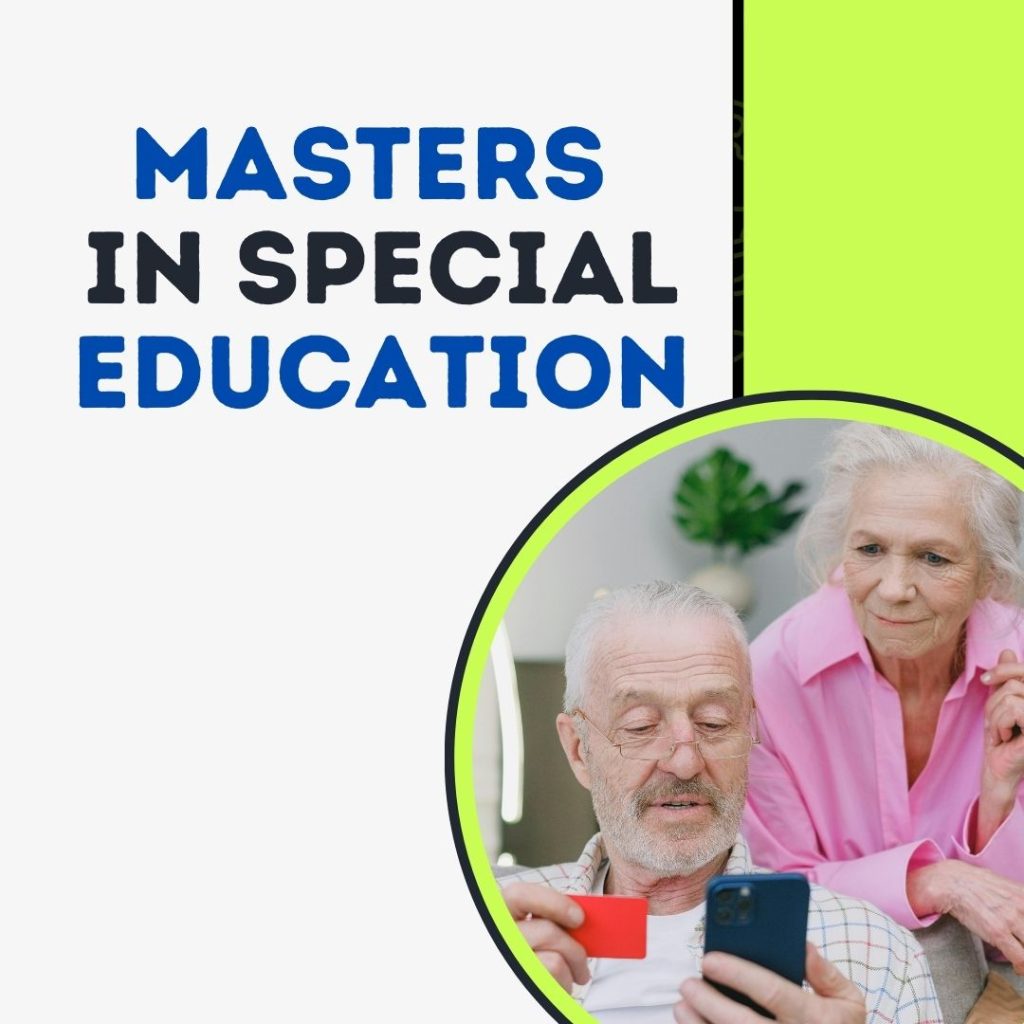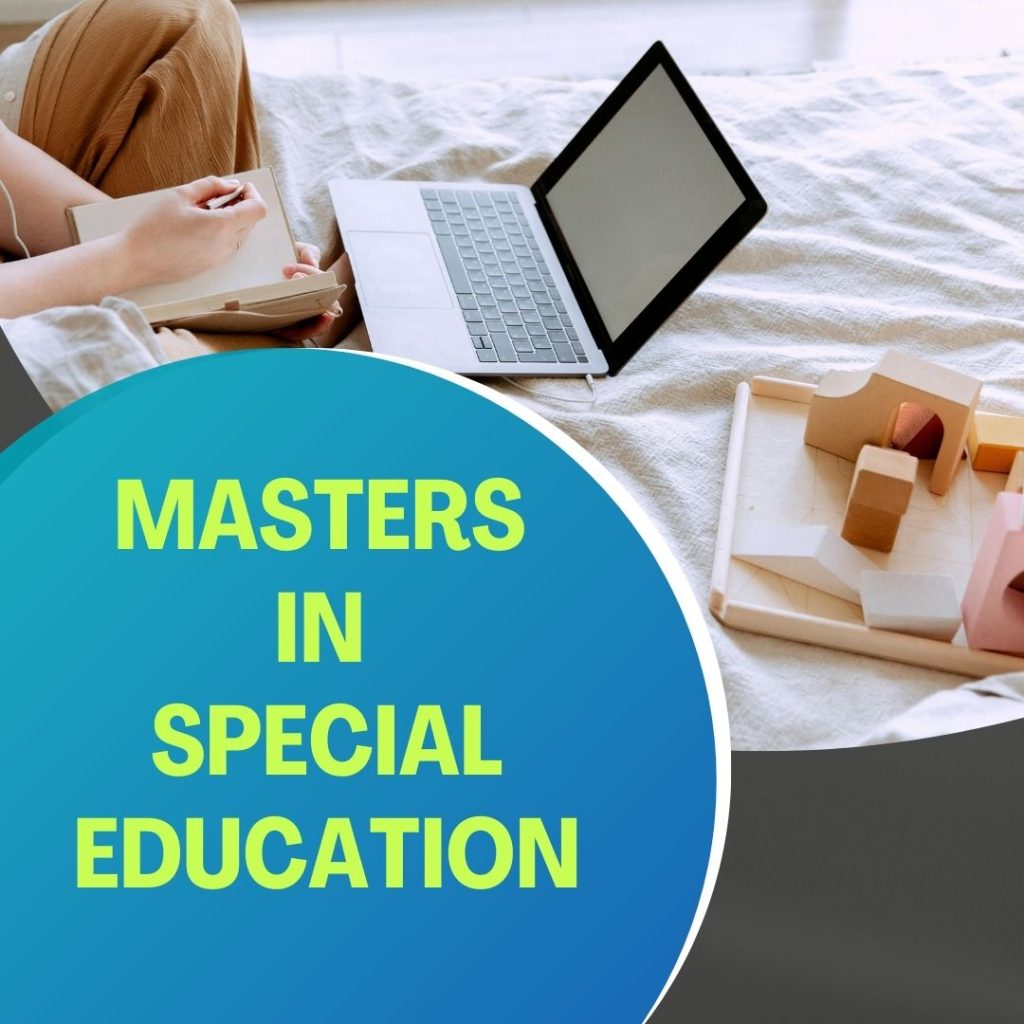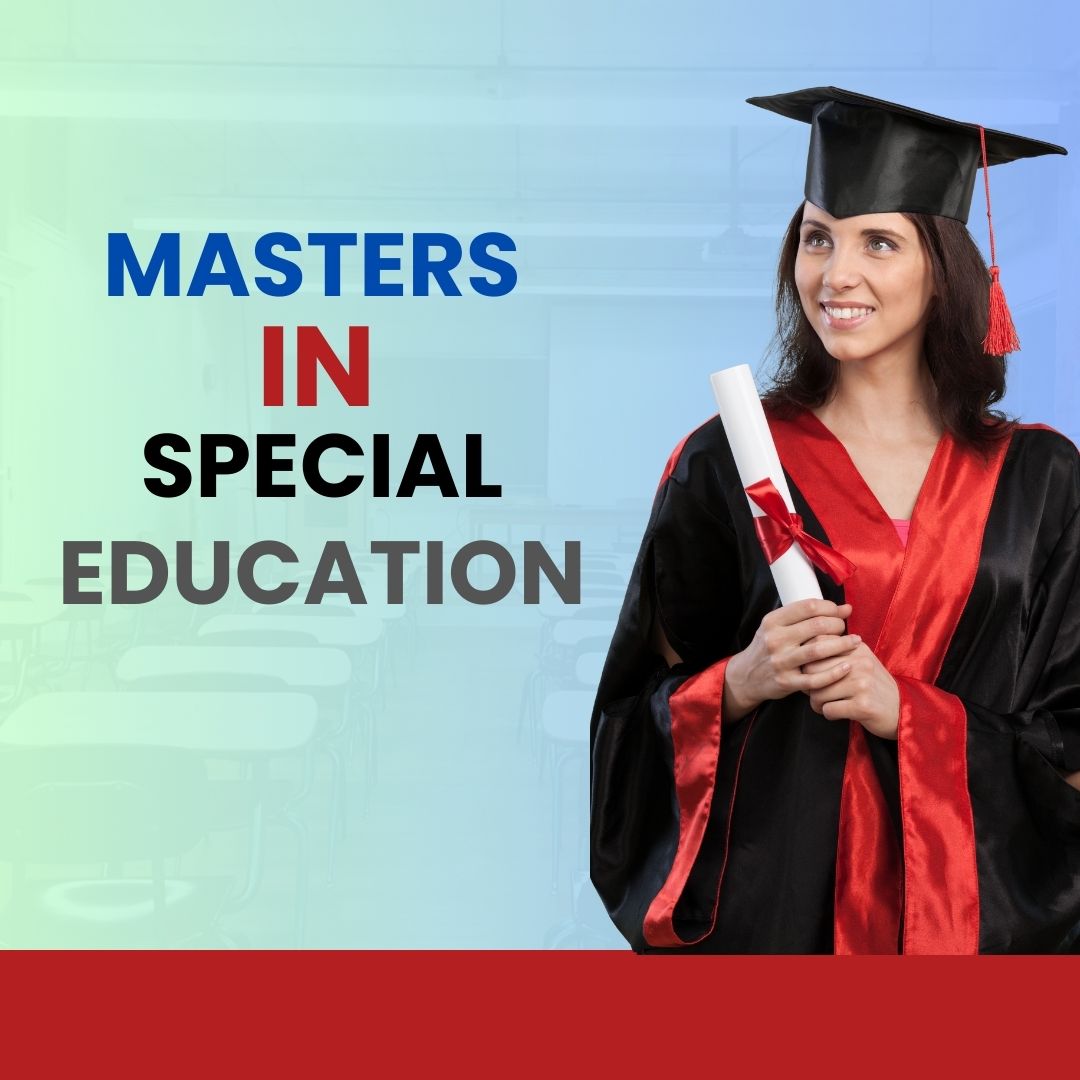Masters in Special Education: Unlock Potential
A Masters in Special Education prepares graduates to support individuals with diverse learning needs. This advanced degree focuses on teaching strategies tailored for students with disabilities.
Embarking on a Masters in Special Education equips educators with the expertise to design inclusive classrooms and curricula that address a wide range of learning differences. The program delves into assessment techniques, adaptive technologies, and legislative policies ensuring equitable education.
Graduates emerge as advocates for students requiring specialized educational approaches, understanding the significance of individualized education plans (IEPs) and the role of interprofessional collaboration in fostering student success. This graduate-level training is essential for those aiming to make a significant impact in the lives of learners with special needs, advancing their own careers while shaping flexible and accessible learning environments. Pursuing this degree marks a commitment to enhancing educational experiences for all students, regardless of their abilities.
The Growing Need For Special Education Experts
The demand for qualified special education experts is surging. With diverse learner needs emerging in classrooms, educators who specialize in creating adaptive learning environments are critical. These professionals possess the skills to accommodate students with varied learning challenges, ensuring equitable opportunities for academic success.
Rising Prevalence Of Special Needs
Statistics reveal an increase in students identified with special needs. Early intervention and recognition of learning disabilities highlight the importance of specialized expertise. Trends show that special education teachers are essential for addressing this growing demographic.
- Autism Spectrum Disorders (ASD) rates are climbing.
- Attention Deficit Hyperactivity Disorder (ADHD) affects learning dynamics.
- Dyslexia and other learning disabilities demand tailored teaching methods.
Education As A Tool For Inclusion
Inclusion in education promotes a sense of belonging among all students. Special education experts craft programs that support diverse learning styles. Universal Design for Learning (UDL) and Individualized Education Programs (IEPs) exemplify tools used to foster inclusive classrooms.
| Tool | Function | Impact |
|---|---|---|
| UDL | Varied teaching approaches. | Engages all learners. |
| IEPs | Custom learning strategies. | Meets individual needs. |

What Is A Masters In Special Education?
Imagine a classroom where every child’s needs are met with expertise. A Masters in Special Education trains teachers for just that. This degree nurtures advanced skills for educators. These skills help teach students with diverse learning needs. Teachers become specialists in creating supportive learning environments. This degree is more than teaching. It’s about making a real difference in students’ lives.
Scope Of The Program
The scope of a Masters in Special Education program is vast. Graduates step into roles that shape futures. They:
- Assess individual needs to tailor learning strategies.
- Collaborate with professionals for multifaceted support.
- Educate families and communities to foster inclusive environments.
This program equips professionals to impact educational systems. It caters to various career paths. These include special education teachers, consultants, and administration roles.
Core Courses And Specializations
The program’s heart lies in its core courses and specializations. Here’s what to expect:
| Core Courses | Specializations |
|---|---|
| Assessment and Evaluation | Autism Spectrum Disorders |
| Instructional Strategies | Behavioral Interventions |
| Child and Adolescent Development | Speech and Language Impairments |
| Special Education Law | Learning Disabilities |
These courses lay a strong foundation. Specializations hone specific interests. Students tailor their education to the needs they’re most passionate about addressing.
A Masters in Special Education empowers educators. It enriches lives. The program produces leaders in educational reform. Are you ready to be part of this vital field?
Benefits Of Pursuing A Masters In Special Education
A Masters in Special Education equips individuals with advanced skills and knowledge. It focuses on supporting students with diverse needs. This degree leads to personal satisfaction and career growth. Below we dive into the core benefits of this worthwhile pursuit.
Personal Growth And Fulfillment
- Deepen empathy for students with unique challenges.
- Gain specialized skills to affect lives positively.
- Reflect on personal values and commitment to education.
- Join a community of caregivers dedicated to inclusion.
Professional Advantages
Advance your career with a Masters in Special Education. This degree opens doors to numerous opportunities.
| Advantages | Details |
|---|---|
| Higher salary potential | Earn more with advanced qualifications. |
| Leadership roles | Step into positions such as special ed coordinator. |
| Focused expertise | Specialize in areas like autism spectrum disorders. |
| Policy development | Contribute to creating inclusive education policies. |
Becoming an expert in special education can inspire others to embrace diversity. It enriches learning environments and prepares students for life’s challenges. Educators ready for this journey make lasting impacts in and out of the classroom.
Careers With A Masters In Special Education
A Masters in Special Education opens up a diverse range of career paths. Educators with this degree possess specialized knowledge. This expertise makes a significant difference in lives of students with unique learning needs. Let’s explore various careers one can pursue with this advanced qualification.
Traditional And Emerging Roles
The scope for professionals in Special Education goes beyond traditional teaching roles. Within educational settings, graduates find positions as specialized teachers, counsellors, and administrators. Inclusive education also requires specialist skills to support classroom integration. New roles are emerging as technology advances. These include educational software consultants and assistive technology coordinators. Below is a snapshot of positions available:
- Special Education Teacher: Lead classrooms tailored to special needs students.
- Inclusion Specialist: Facilitate effective integration of students into mainstream classes.
- Behavioural Interventionist: Develop and implement behaviour plans.
- Special Education Administrator: Oversee programs and compliance with laws.
- Assistive Technology Specialist: Enhance learning through technology.
Salary And Job Security
A Masters in Special Education not only advances careers but also leads to higher salaries. Job stability is another compelling reason to pursue this degree. Schools consistently require qualified special education teachers. The US Bureau of Labour Statistics reports steady growth in this field. Below are average annual salaries for some roles:
| Position | Salary Range |
|---|---|
| Special Education Teacher | $40,000 – $70,000 |
| Inclusion Specialist | $45,000 – $75,000 |
| Behavioural Interventionist | $38,000 – $58,000 |
| Special Education Administrator | $50,000 – $80,000 |
| Assistive Technology Specialist | $45,000 – $65,000 |
Numbers reflect national averages and can vary by location, experience, and education. A Masters in Special Education enhances job prospects and potential earnings.

Innovative Teaching Strategies In Special Education
Teachers are finding new ways to teach students with special needs. These ways help each student learn better. Let’s look at some smart teaching plans.
Customized Learning Plans
Every student is different. Teachers make special plans for each one. They choose activities that fit how each student learns best. This helps students reach their goals.
- Meeting Individual Needs: Teachers check what each student knows. Then they make lessons just for them.
- Personal Goals: Students have their own goals. Teachers help them get there step by step.
- Feedback Loops: Teachers talk with students a lot. They tell students how they’re doing and what they can do better.
Technology Integration
Good gadgets and apps can help students learn. Teachers use technology to make lessons fun and helpful. This can make learning easier for students with special needs.
| Tools | How They Help |
|---|---|
| Tablets | Students can touch and move things on the screen. |
| Educational Apps | Games and stories make learning interesting. |
| Audio Books | Listening to stories helps with understanding. |
Teachers also use videos and special programs to teach new words and ideas.
Legal And Ethical Considerations In Special Education
People who teach special education students have a big job. They must know the laws and do the right thing. This keeps students safe and helps them learn well. Let’s talk about the rules and good choices in special education.
Understanding Special Education Law
Teachers must understand the laws for teaching special students. Laws help students get what they need to learn. These laws change, so teachers must always learn new things.
- Individuals with Disabilities Education Act (IDEA) – This law says schools must help special education students.
- Free Appropriate Public Education (FAPE) – Schools must give education that fits each special student without cost.
- Least Restrictive Environment (LRE) – Special students should learn with others when possible.
| Law | What It Does |
|---|---|
| Section 504 | Stops schools from leaving out students with disabilities. |
| Americans with Disabilities Act (ADA) | Guards against unfair treatment in schools and other places. |
Maintaining Ethical Standards
All teachers must make good choices for their students. They must follow the rules. They must treat all students fair and kind. Here is what they should do:
- Learn about each student’s needs.
- Make plans that are just right for each student.
- Tell the truth when talking about student progress.
Being honest and doing what is right creates trust. Trust helps everyone do their best.
Success Stories: Impact Of Special Educators
Special educators change lives every day. Their stories inspire and show the real difference they make. In Success Stories: Impact of Special Educators, we celebrate these heroes. Their work is not just a job, it’s a calling. Let’s delve into some of the transformative experiences they create.
Transformative Student Experiences
Learning is a journey unique to each student. Special educators guide this journey. They unlock potentials previously unseen. Here are brief accounts of such journeys:
- John: Struggled with autism. With tailored teaching, he excelled in math and art.
- Emma: Faced hearing challenges. With her teacher’s support, she blossomed into a confident communicator.
- Alex: Had difficulty reading. Specialized programs and patience led him to enjoy books.
Teachers Making A Difference
Every great story needs a hero. In the realm of special education, it’s the teachers. Their impact resonates far beyond classroom walls. See how they’ve changed lives:
| Teacher | Contribution | Outcome |
|---|---|---|
| Mrs. Smith | Introduced sensory activities | Students improved in self-regulation and engagement. |
| Mr. Gomez | Launched a peer mentor program | Developed social skills and friendships among students. |
| Ms. Patel | Started a sign language club | Facilitated inclusive communication for all students. |
Getting Started: Admission Requirements And Prerequisites
Welcome to the thrilling journey of pursuing a Masters in Special Education. This advanced degree equips educators with the skills and knowledge to support students with diverse learning needs. It’s essential to understand the admission requirements and prerequisites before embarking on this transformative educational path. Let’s explore what you need to kickstart your graduate studies in Special Education.
Required Credentials
Embarking on a Masters in Special Education demands several key documents:
- Bachelor’s degree from an accredited institution
- Transcripts showcasing past academic performance
- Letters of Recommendation, usually two or three
- A thoughtful Statement of Purpose
- Valid Teaching Certification may be required
| Document | Description | Typical Number Required |
|---|---|---|
| Transcripts | Academic Records | 1 per institution |
| Letters of Recommendation | Professional Endorsements | 2-3 |
| Statement of Purpose | Personal Essay | 1 |
Applicants must also often meet minimum GPA requirements and provide standardized test scores, such as the GRE.
Choosing The Right Program
Selecting the perfect program is crucial for your career in Special Education. Consider these factors:
- Accreditation: Ensure the program holds proper accreditation.
- Curriculum: Match your interests and career goals.
- Faculty Expertise: Look for experienced educators and researchers.
- Hands-On Experience: Prioritize opportunities for practical application.
- Flexibility: Consider the program’s format and schedules.
Research and reach out to alumni or current students to gain insights into the program’s impact on their careers. Remember to note application deadlines and financial aid options.
Financial Planning For A Special Education Degree
Investing in a Masters in Special Education is a smart move for those passionate about teaching diverse learners. Yet, the cost can be daunting. Thoughtful financial planning transforms this dream into a manageable reality. Below, explore how scholarships and work balance help finance your journey.
Scholarships And Grants
Reducing program expenses is easier with scholarships and grants. Unlike loans, these do not require repayment. Here’s how they benefit you:
- Lower debt: Keep educational borrowing to a minimum
- Merit-based awards: Excel in academics or service for money
- Need-based grants: Support for those with financial challenges
Start with your college’s aid office. Use databases like Scholarships.com for more opportunities.
Balancing Work And School
Part-time jobs offer income and flexibility. Consider these strategies:
- Select roles wisely: Find jobs with study-friendly hours.
- Communicate with employers: Discuss your school commitments upfront.
- Time management: Align work schedules with class timelines.
Pursue work that enhances your education. Roles like teaching assistant provide both money and relevant experience.

The Role Of Research In Advancing Special Education
The Role of Research in Advancing Special Education cannot be overstated. Groundbreaking discoveries and persistent inquiries drive the field forward, offering new strategies and insights. Research shapes how educators understand and respond to the diverse needs of students with disabilities. It leads to improved outcomes, ensures best practices, and tailors education to every learner’s unique challenges.
Current Trends In Special Education Research
Recent studies shed light on crucial areas:
- Technology integration in the classroom
- Effectiveness of inclusive education models
- Early intervention techniques for better long-term results
- Impact of teacher training on student success
These trends not only focus on practical outcomes but also on fostering an environment where students flourish emotionally and academically.
Contributing To The Field Through Scholarship
Joining the ranks of scholars in Special Education means you:
- Add to a body of knowledge with original research.
- Help develop new teaching strategies.
- Influence policies for inclusive education.
Your work can directly enhance learning experiences for those with special needs.
| Research Area | Benefits |
|---|---|
| Assistive Technologies | Customize learning tools for student accessibility. |
| Behavioral Strategies | Improve classroom management and student engagement. |
| Curriculum Development | Design curricula that cater to diverse learning needs. |
Frequently Asked Questions On Masters In Special Education
What Is A Masters In Special Education?
A Masters in Special Education is an advanced degree. It equips educators with specialized skills to teach students with diverse learning needs. Graduates learn strategies to support individuals with disabilities.
How Long Does It Take To Complete The Degree?
Typically, it takes about two years to complete a Masters in Special Education. This can vary based on program structure and whether you attend part-time or full-time.
What Careers Are Available With This Degree?
Graduates can pursue careers as special education teachers, consultants, or administrators. They may also work in advocacy, policy development, or special education resources design.
Can I Study Masters In Special Education Online?
Yes, many universities offer online programs for a Masters in Special Education. These online options provide flexibility for working professionals to further their education while maintaining their current positions.
Conclusion
Embarking on a Master’s in Special Education paves the way for profound impact. This degree sharpens skills to uplift diverse learners. Dedicated educators emerge, ready to transform lives. The journey is challenging, but the reward is unparalleled: making education accessible for all.
Embrace this path and witness its life-changing effects.







